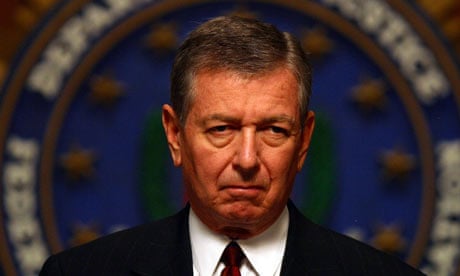But for the events of 11 September 2001 it seems likely that John Ashcroft would have been remembered, if at all, as an unexceptional, run-of-the-mill, socially conservative attorney general of the United States. As it is, he seems likely to be remembered as the chief law officer of an administration notable for its unprecedented disregard of legal values.
During the summer of 2001, Ashcroft refused the FBI additional funds to fight al-Qaida. But the twin towers changed all that. The president is said to have told him "Don't let this happen again." Ashcroft responded by announcing what he called a new "paradigm of prevention", a programme under which thousands of young men were arrested, detained, searched and questioned with a view to unearthing terrorist links. At his nomination hearing Ashcroft had described racial profiling of suspects as "wrong and unconstitutional, no matter what the context", but the programme was in practice directed at young Arabs and Muslims. It was also directed at immigrants, who did not enjoy the constitutional rights of US citizens and among whom technical breaches of immigration law were rife. Ashcroft warned that if immigrants overstayed their visas "even by one day" they would be arrested and detained. The weakness of the policy was that it identified few, if any, terrorists, antagonised the Muslim community and could not be used against US citizens. There are some parallels with the policy adopted in this country in 2001.
Ashcroft does not appear to have been the architect of the policies with which the Bush administration has come to be most closely associated: Guantánamo, extraordinary rendition, "enhanced interrogation techniques" and trial by military commission. Indeed, he seems to have learned at a very late stage of what became the president's order of 13 November 2001 authorising trial by military commission. But he was content that al-Qaida and Taliban detainees should not be treated as prisoners of war, and (in one of the few documents to emerge bearing his signature) supplied the president with arguments to contend that Taliban combatants in Afghanistan were not entitled to protection under the Geneva conventions. He also connived in the denial of constitutional protection to John Walker Lindh, a US citizen, and greatly weakened the FBI guidelines on domestic spying, although he did resist strong pressure to renew the unlawful "terrorist surveillance programme".
The now well-known memos of August 2002 redefining torture and reviewing current methods of interrogation, later rejected and rescinded, were written by Ashcroft's subordinates, not him, but it seems probable that Ashcroft knew of their content, and clearly he should have. He certainly knew, from his attendance at a committee also attended by senior cabinet members, of the "enhanced" interrogation techniques used by the CIA on some high-level suspects. On one occasion, as the CIA director was giving details of what was proposed, Ashcroft is said to have observed: "History will not judge us kindly." In that at least he was right.
